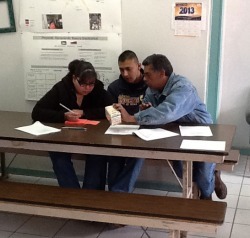Reassembling Rubbish Electronics in Fronteras, Mexico

Fair trade has both its proponents and its detractors, but the vast majority of the research devoted to it draws on cases of agrofoods and textiles or, more generally, on production in the ‘South’ for consumption in the ‘North’. What fair trade electronics refurbishment and recycling might look like and how it might be organized – indeed, whether such a thing is possible or desirable – remain open questions. These are questions that members of RDM and Memorial University’s Department of Geography are attempting to research together. The research with RDM is part of a SSHRC Insight grant led by Josh Lepawsky.
The recent workshop at RDM was devoted to several goals. These included enabling RDM members to act as co-researchers through discussions of the nature of research, methods, and collectively conceptualizing key concepts for the project: attempting to better understand the knowledge, skills, and creativity of people who re-imagine and rework electronics disposed of in Canada and elsewhere into valuable commodities.
Other goals included collaboratively working through what it might mean to tell research stories through a technique called ‘photovoice’. Photovoice is a form of participatory action research. It involves equipping participants (who act as co-researchers, not research subjects in the classical sense) with cameras so that they can tell their stories visually and through their own words (e.g., recorded verbal descriptions of what an image a participant takes means for her or him). The research team is interested in, among other things, eliciting narratives about the variety of skills that co-researchers at RDM possess in terms of re-imagining that which is considered waste in some places (e.g., Canada) into various forms of value. The team thinks that this research approach may offer a way for the people and places consistently framed by others (e.g., ENGOs, media, policy circles) as victims whose lives are defined solely in terms of needs, deficiency, and victimization to frame their stories on their own terms and diffuse them to a wide audience.